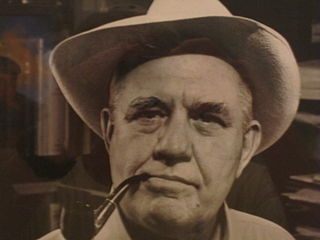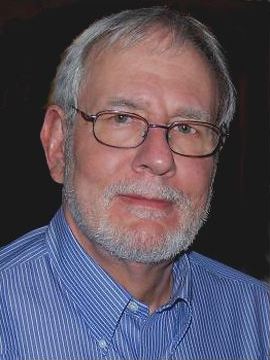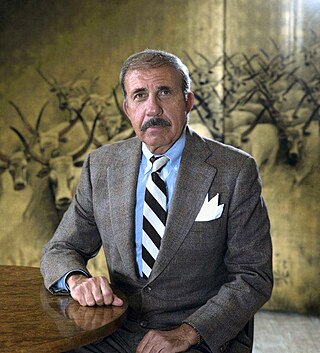Related Research Articles

The University of Texas at Austin is a public research university in Austin, Texas, United States. Founded in 1883, it is the flagship institution of the University of Texas System. With 52,384 students as of Fall 2022, it is also the largest institution in the system.

Ralph Webster Yarborough was an American politician and lawyer. He was a Texas Democratic politician who served in the United States Senate from 1957 to 1971 and was a leader of the progressive wing of his party. Along with Senate Majority Leader Lyndon B. Johnson and Speaker of the House Sam Rayburn, but unlike most Southern congressmen, Yarborough refused to support the 1956 Southern Manifesto, which called for resistance to the racial integration of schools and other public places. Yarborough voted in favor of the Civil Rights Acts of 1957, 1960, 1964, and 1968, as well as the 24th Amendment to the U.S. Constitution, the Voting Rights Act of 1965, and the confirmation of Thurgood Marshall to the U.S. Supreme Court. Yarborough was the only senator from a state that was part of the Confederacy to vote for all five bills.

James Frank Dobie was an American folklorist, writer, and newspaper columnist best known for his many books depicting the richness and traditions of life in rural Texas during the days of the open range. He was known in his lifetime for his outspoken liberal views against Texas state politics, and he carried out a long, personal war against what he saw as braggart Texans, religious prejudice, restraints on individual liberty, and the mechanized world's assault on the human spirit. He was instrumental in saving the Texas Longhorn breed of cattle from extinction.

Robert Allan Shivers was an American politician who served as the 37th governor of Texas. Shivers was a leader of the Texas Democratic Party during the turbulent 1940s and 1950s and developed the lieutenant governor's post into an extremely powerful perch in the state government.

George Eastland Christian Jr. was an American journalist and White House staffer, who served as the twelfth White House Press Secretary from 1966 to 1969.

The Lyndon B. Johnson School of Public Affairs is a graduate school at the University of Texas at Austin that was founded in 1970. The school offers training in public policy analysis and administration in government and public affairs-related areas of the private and nonprofit sectors. Degree programs include a Master of Public Affairs (MPAff), a mid-career MPAff sequence, 16 MPAff dual degree programs, a Master of Global Policy Studies (MGPS), eight MGPS dual degree programs, an Executive Master of Public Leadership, and a Ph.D. in public policy.
The Texas Observer is an American magazine with a liberal political outlook. The Observer is published bimonthly by a 501(c)(3) nonprofit organization, the Texas Democracy Foundation. It is based in Austin, Texas.
Gayle Reaves is an American journalist who won a Pulitzer Prize and a George Polk Award. She was editor of the Fort Worth Weekly, an alternative newspaper serving the Dallas/Fort Worth Metroplex, from October 2001 to March 2015.
Celia Williams Dugger is an American journalist who is deputy science editor of The New York Times.
Richard A. Oppel is an American newspaper, magazine and digital editor living in Austin, Texas. He was interim editor-in-chief of Texas Monthly, an Austin-based publication with a statewide readership of 2.4 million. The magazine covers the Texas scene, from politics, the environment, industry and education to music, the arts, travel, restaurants, museums and cultural events. While Oppel was editor of The Charlotte Observer (1978–1993), the newspaper earned three Pulitzer Prizes, sharing one for editorial cartoons with The Atlanta Constitution.

Billy Lee Brammer was an author, journalist, and political staffer in Texas and Washington, D.C.. He is best known for his set of three linked novellas titled The Gay Place.
The Texas Cowboys is an honorary student service organization at the University of Texas at Austin. The organization was founded in 1922 with the purpose of serving the University of Texas and maintaining Smokey the Cannon. It is considered one of the "oldest and most elite student organizations" at the university. Among its alumni are national politicians, two Texas Governors, prominent businessmen, and professional athletes.

Howard R. Barr (1910–2002) was a prominent twentieth-century architect in Austin, Texas. He received his degree from the University of Texas School of Architecture in 1934. Upon graduation, he worked in the University architect’s office, where his first project was the design of housing units for the new U.T. observatory in West Texas.

Thorne Webb Dreyer is an American writer, editor, publisher, and political activist who played a major role in the 1960s-1970s counterculture, New Left, and underground press movements. Dreyer now lives in Austin, Texas, where he edits the progressive internet news magazine, The Rag Blog, hosts Rag Radio on KOOP 91.7-FM, and is a director of the New Journalism Project.
Joe Bertram Frantz was a historian from the U.S. state of Texas who specialized in the American West.

Harry Joseph Middleton Jr. was an American journalist, author, and library director who served as Lyndon B. Johnson's Presidential speech writer and staff assistant from 1967 to 1969. Middleton was also director of the Lyndon Baines Johnson Library and Museum from 1971 until 2002, and led the Lyndon Baines Johnson Foundation from 1993 until 2004.
Malcolm Everett "Mac" Wallace was an American economist for the United States Department of Agriculture. On October 22, 1951, Wallace fatally shot John Douglas Kinser in the clubhouse of an Austin golf course owned by Kinser. A number of authors claim Wallace was involved in a conspiracy to assassinate President John F. Kennedy upon orders from then-Vice President Lyndon B. Johnson.
Caro Crawford Brown was a Pulitzer Prize-winning American journalist.
John Ben Shepperd was an American lawyer, businessman, and politician who served as the Secretary of State (1950–1952) and Attorney General (1953–1957) for the U.S. state of Texas.
DeWitt Carter Reddick was a Texas journalist and professor who served as the first dean of the College of Communication at the University of Texas. In a career spanning six decades, Reddick instructed many notable journalists and is credited with helping to bring a professional spirit to the business of journalism.
References
- ↑ "UT History Central, Daily Texan Editors". Texas Exes. Retrieved 2014-12-21.
- 1 2 Dave Mann (2014-05-01). "Ronnie Dugger: Godfather of Progressive Journalism in Texas". The Texas Observer. Retrieved 2014-12-21.
- 1 2 3 Thorne Webb Dreyer (2012-06-15). "Texas Observer Founding Editor Ronnie Dugger". The Rag Blog. Retrieved 2014-12-21.
- ↑ Brad Buchholz (2012-04-29). "Ronnie Dugger: The free man". Austin American-Statesman . Archived from the original on 2012-10-17. Retrieved 2021-07-14.
- 1 2 3 "Ronnie Dugger". Spartacus Educational. Retrieved 2014-12-21.
- ↑ Robert Bryce (2000-08-25). "The Candidate From Brown & Root". The Austin Chronicle. Retrieved 2014-12-23.